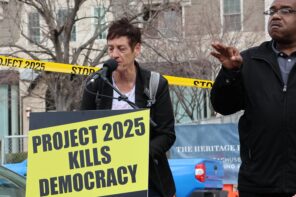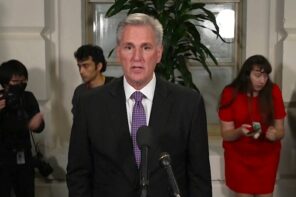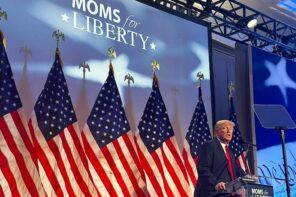On Tuesday, July 1, in a speech delivered at the Eastside Community Ministry in Zanesville, Ohio, Sen. Barack Obama pledged that if he were elected president, he would overhaul and expand President George W. Bush's faith-based initiative. Obama's plan for a "Council for Faith-Based and Neighborhood Partnerships" (a name remarkably similar Bush's White House Office of Faith-Based and Community Initiatives) would "help set our national agenda" and deal with such issues as AIDS in inner cities and climate change.
"The challenges we face today—from saving our planet to ending poverty—are simply too big for government to solve alone," Obama said. "We need an all-hands-on-deck approach."
The two immediately discernible differences between Bush's project, which in fiscal year 2007 doled out $2.2-billion to faith-based organizations (10.8 percent of a total of $20.4-billion in competitive grants awarded to nonprofit groups by 11 federal agencies) are over the issues of proselytization and discriminatory hiring practices. While Team Bush has appeared to look away while religious groups received federal money yet continued to proselytize amongst the people who received its services, Obama is opposed to that practice. The Senator also declared that religious groups receiving government grants should not be allowed to discriminate in its hiring practices.
"If you get a federal grant, you can't use that grant money to proselytize to the people you help and you can't discriminate against them—or against the people you hire—on the basis of their religion," Obama said. "Federal dollars that go directly to churches, temples, and mosques can only be used on secular programs."
In keeping with his recent outreach efforts to religious communities, Obama pointed out that "There are some who bristle at the notion that faith has a place in the public square. But the fact is leaders in both parties have recognized the value of a partnership between the White House and faith-based groups."
While some immediately applauded Obama, as anticipated, some did "bristle." Others were merely confused.
A headline at the conservative Heritage Foundation's website read "Obama Takes the 'Faith' Out of Faith-Based Initiative." The Family Research Council labeled it "Faith-Based Feint?" The Christian Post saw it as "Obama Prying Loose Evangelicals from Republicans." The Progressive magazine called his new plan "Obama's Faith-Based Folly," and The National Journal asked if Obama was "Out-Bushing Bush?"
The Obama campaign released a statement from John DiIulio, the first director of Bush's faith-based program, endorsing the new plan.
The Rev. Barry Lynn, the executive director of Americans United for Separation of Church and State, a group that opposed Bush's faith-based initiative from its inception, expressed his "disappointment." "This initiative has been a failure on all counts, and it ought to be shut down, not expanded," he said. However, Lynn did allow that he was encouraged that the plan would not try to fudge church-state boundaries: "It is imperative that public funds not pay for proselytizing or subsidize discrimination in hiring. Obama has promised that he will not support publicly funded proselytism or discrimination in hiring, and that's an important commitment."
The Rev. Richard Cizik, vice president for governmental affairs for the National Association of Evangelicals, and one of those who has bucked the old-time evangelical leaders over several issues, including global warming, said that Obama's position on hiring "would constitute a deal-breaker" for many evangelicals. "For those of who us who believe in protecting the integrity of our religious institutions, this is a fundamental right. He's rolling back the Bush protections. That's extremely disappointing.'"
Jim Towey, who ran the White House Office from 2002 to 2006, said that while he was encouraged by Obama's remarks, he thought the hiring mandates would be a problem. "The reality is an Orthodox Jewish group ceases to be Orthodox if they have to hire atheists or Southern Baptists," Towey said. "What Senator Obama is saying is groups will have to secularize if they play ball with government and receive federal funding, and that flies in the face of what many small groups want."
In his daily FRC (Family Research Council) Action Update, Tony Perkins, the president of the Family Research Council, pointed out that while Obama's plan "sounds appealing," his opposition to California's anti-same-sex marriage ballot initiative "provide a frightening glimpse" into what the plan might really bring. "While telling the world he will up hold the faith-based initiative as the cornerstone of his administration, Obama says that a cornerstone of society—heterosexual marriage—is 'divisive and discriminatory,' wrote Perkins.
"Doesn't this mean that faith-based organizations that support marriage will be disqualified from federal funding under an Obama presidency?" Perkins went on. "It would be next to impossible for ministries that promote traditional marriage to participate in a Healthy Marriage project funded through an Obama faith-based initiative. There is no doubt that Sen. Obama is polished on the issue of faith, but it's his record—not his rhetoric—that speaks louder."
Background
It is notable that Obama's outreach to Christians has led him to stake out a position on faith-based initiatives at just about the same time President Bush appears to attempting to build his legacy around that project. On July 26, Bush addressed a Washington, D.C. conference of administration officials and religious leaders, and touted the successes of his faith-based initiative. He followed that up with his Saturday radio broadcast that again extolled the project's virtues.
In January 2001, surrounded by a broad mix of religious leaders, Bush announced an executive order bringing the White House Office of Faith-Based and Community Initiatives into existence. In a nod to bi-partisanship, he name John DiIulio, an academic with Democratic Party credentials to be the first faith-based czar. Bush also issued an executive order establishing Centers for Faith-Based and Community Initiatives at the Departments of Health and Human Services, Labor, Justice, Education and Housing and Urban Development. The Centers would eventually be established at 11 government agencies.
Bush's faith-based initiative was formulated to be the centerpiece of his domestic agenda, and was geared toward displaying the fact that the man who ran on a platform of "compassionate conservatism," was indeed a compassionate conservative.
While the two buzz phrases touted by Team Bush were "compassionate conservatism" and "releasing the armies of compassion," in reality the initiative was aimed at bringing several pieces of the conservative agenda together; limited government participation in doling out social services, the privatization/religio-ization of those social services, and the creation of a new social contract.
From the outset, the project had problems. Major conservative evangelical leaders such as the late Rev. Jerry Falwell and Pat Robertson opposed the initiative because they were concerned that groups like the Church of Scientology and the National of Islam would receive government grants. (Robertson later reversed course and his controversial enterprise, Operation Blessing, was the recipient of as much as $14 million in federal grants.) Other evangelical leaders were concerned that accepting federal funds meant accepting federal guidelines which would water down their religious missions. Liberal critics were concerned that the initiative would be used to consolidate Bush's base—providing money to conservative Christian evangelical groups—and there would be an end run around the separation of church and state.
In Tempting Faith: An Inside Story of Political Seduction, David Kuo, the former second-in-command of the White House Office, charged that the Bush White House had politicized the initiative, sometimes rejecting applications for federal faith-based funds because they came from non-Christian applicants, mocked leaders of the Christian Right, and betrayed the very essence of the faith-based initiative's charge to help the poor.
And just within the past few weeks, ABC News revealed that the administration had awarded a large grant to Victory Outreach, a faith-based group that staff had declined to recommend for the money. It was deemed that too much of the money was going to a consulting firm run by Lisa Trevino Cummins (who had previously headed Hispanic outreach efforts for the White House Office of Faith-Based and Community Initiatives), and not to children's services.
+++
One of the biggest—and still largely unanswered—questions about giving money to religious organizations to provide social services is whether these groups actually outperform or perform as well as secular groups or government agencies performing the same tasks. Bush is attempting to build a legacy around his faith-based initiative by using a pocketful of anecdotes. But no matter how well-meaning and moving these stories are, they are only anecdotes, not evidence that these programs have worked. If Obama's makeover is to be taken seriously, if his proposed version of the faith-based initiative can work at all, there must be mechanisms in place that will rigorously measure results and outcomes.
Editor's note: For Randall Balmer's Op-Ed on this topic click here…
s




